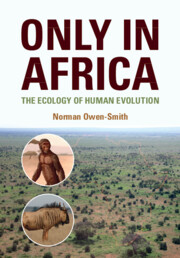Book contents
- Only in Africa
- Only in Africa
- Copyright page
- Dedication
- Contents
- Foreword
- Preface
- Abbreviations
- Part I The Physical Cradle: Land Forms, Geology, Climate, Hydrology and Soils
- Part II The Savanna Garden: Grassy Vegetation and Plant Dynamics
- Part III The Big Mammal Menagerie: Herbivores, Carnivores and Their Ecosystem Impacts
- Part IV Evolutionary Transitions: From Primate Ancestors to Modern Humans
- Chapter 15 Primate Predecessors: From Trees to Ground
- Chapter 16 Primate Ecology: From Forests into Savannas
- Chapter 17 How an Ape Became a Hunter
- Chapter 18 Cultural Evolution: From Tools to Art and Genes
- Chapter 19 Reticulate Evolution Through Turbulent Times
- Chapter 20 Prospects For a Lonely Planet
- Appendix Scientific Names of Extant Animal and Plant Species Mentioned in the Book Chapters (Ecologically Conservative with Regard to Species Recognition)
- Index
- References
Chapter 19 - Reticulate Evolution Through Turbulent Times
from Part IV - Evolutionary Transitions: From Primate Ancestors to Modern Humans
Published online by Cambridge University Press: 09 September 2021
- Only in Africa
- Only in Africa
- Copyright page
- Dedication
- Contents
- Foreword
- Preface
- Abbreviations
- Part I The Physical Cradle: Land Forms, Geology, Climate, Hydrology and Soils
- Part II The Savanna Garden: Grassy Vegetation and Plant Dynamics
- Part III The Big Mammal Menagerie: Herbivores, Carnivores and Their Ecosystem Impacts
- Part IV Evolutionary Transitions: From Primate Ancestors to Modern Humans
- Chapter 15 Primate Predecessors: From Trees to Ground
- Chapter 16 Primate Ecology: From Forests into Savannas
- Chapter 17 How an Ape Became a Hunter
- Chapter 18 Cultural Evolution: From Tools to Art and Genes
- Chapter 19 Reticulate Evolution Through Turbulent Times
- Chapter 20 Prospects For a Lonely Planet
- Appendix Scientific Names of Extant Animal and Plant Species Mentioned in the Book Chapters (Ecologically Conservative with Regard to Species Recognition)
- Index
- References
Summary
This chapter looks ahead to the prospects for conserving Africa’s large mammal diversity in an increasingly crowded world. These animals played an integral role in our evolution and our continuing fascination with them drives eco-tourism industries. Attempts to rewild the continents that lost most of their large mammas are misdirected. Those retained in Africa should be conserved to benefit us both spiritually and materially.
- Type
- Chapter
- Information
- Only in AfricaThe Ecology of Human Evolution, pp. 329 - 339Publisher: Cambridge University PressPrint publication year: 2021

